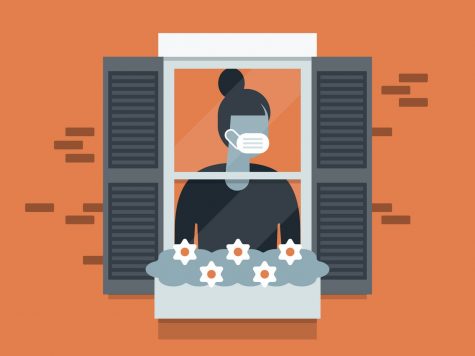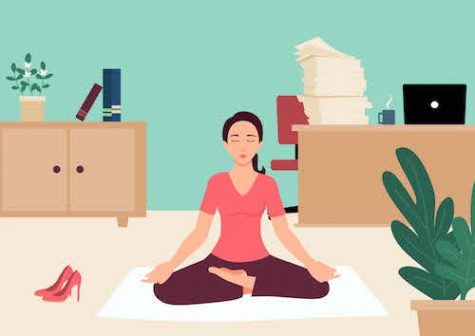‘Languishing’ on the rise as pandemic, shutdowns continue
Correct me if I am wrong, but in the pandemic you were either walking around your house, eating a sandwich, watching youtube videos, attending classes, completing assignments and/ or reading. If I got at least two of them right you owe me a dollar. On a serious note, even with all these wonderful activities, you still experienced a feeling of stagnation and emptiness or just meh, right?
What is Languishing ?
 If yes, you are not the only one. Millions of people across the globe have experienced this exact sentiment. This specific feeling is called languishing, a term originated from the Latin word “languere,” which means to be weak or faint. It was coined by the sociologist Corey Keyes. Languishing was/is a common feeling for many people during the COVID-19 pandemic.
If yes, you are not the only one. Millions of people across the globe have experienced this exact sentiment. This specific feeling is called languishing, a term originated from the Latin word “languere,” which means to be weak or faint. It was coined by the sociologist Corey Keyes. Languishing was/is a common feeling for many people during the COVID-19 pandemic.
“The pandemic is a significant change for most people, affecting different areas of their lives,” psychiatrist and author Gayani DeSilva, MD, tells Health.
Due to languishing it can be difficult to make decisions, at the point when we can’t promptly settle on a choice between known decisions, it’s called ambivalence. Dr. DeSilva further explains that “Languishing can be thought of as the physical and conscious manifestation of being unconsciously or subconsciously ambivalent. There are many aspects of this pandemic—the threat of the virus itself, the travel and mask restrictions, the vaccine, and more—that leave us confused.”
“At first I was happy ( about quarantine) because I did not want to go to school and I could just stay at home, but after a while it got stressful and overwhelming.” said junior Sheila Fleurival. “Especially because you could not go anywhere during quarantine”
Essentially, the pandemic incurred significant damage from numerous points of view, and has left us languishing. A ton of it is because of the qualm the pandemic induces, and how it interferes with motivators, like arranging occasions or making life objectives for what’s to come.
“For over a year now the majority of Americans have been asked to stay at home, work at home, do school from home, shop, play and socialize at home,” Psychologist Sheila Forman, PhD tells Health. “At first, for some, it was a welcome respite from the daily grind. But as time went on and the realities of the pandemic sunk in, what started as a nice way to spend some time became our lives and with it a heightened sense of sadness, loneliness, and depression.”
Is there a difference between depression and languishing?
A substantial number of adults have announced feelings of depression, restlessness, self-destructive tendencies and anxiousness during the COVID 19 pandemic. Nevertheless, experts maintain that depression and languishing are not the same.
Languishing is not “a mental illness, as it doesn’t have the intensity or duration of symptoms of depression or anxiety,” explains Dr. DeSilva. “But it’s also not a feeling of thriving.” It’s like wanting to get dressed up for a night on the town, but choosing to wear comfy pants and go to your usual diner for dinner instead.”
Ways to cope with languishing.

- Rather than zeroing in on what “ought to” make you cheerful, lean toward whatever brings you delight. As long as it’s not perilous, it merits investigating.
- When accessible, treatment can be a gigantic instrument for exploring new and unnerving sentiments, for example, those related with languishing.
- Participating in a careful walk or participating in some type of physical activity could deliver endorphins and reinforce the state of mind. This could help release endorphins and improve disposition and inspiration.
- If you have access to the COVID-19 vaccine, get it. If more people are taking the vaccine, it would bring us closer to the diminishing of masks and it would also provide some internal relief.
- Take short dynamic breaks throughout the day: from performing homegrown tasks to playing with your kids, short meetings of proactive tasks will keep you occupied.
- Follow an online exercise class: due to the internet, there is an immense determination of online exercise courses, a considerable lot of them are free and can be found on YouTube.
- Walk: this tip might be basic, however, it is extremely helpful. Strolling around will assist you with staying dynamic. In the event that you have a call, for instance, stand or stroll around as opposed to plunking down.
- During relaxation time, follow intellectually invigorating exercises: reading, prepackaged games or riddles.
- Relaxation: Meditation and breathing activities can assist you to more readily adapt to pressure.
Your donation will support the student journalists of Parkdale High School. Your contribution will allow us to cover our annual website hosting costs and publish some printed editions, as well.

Mistura is in the Class of 2022 and has been on staff since her sophomore year. She was "pushed lightly" to sign up for Newspaper by freshman English teacher...









